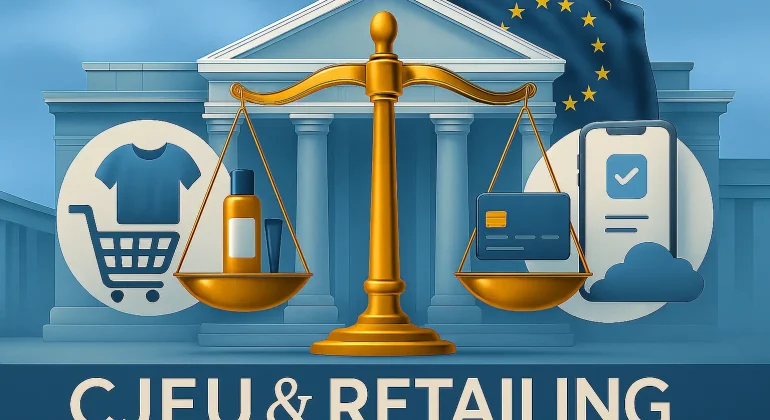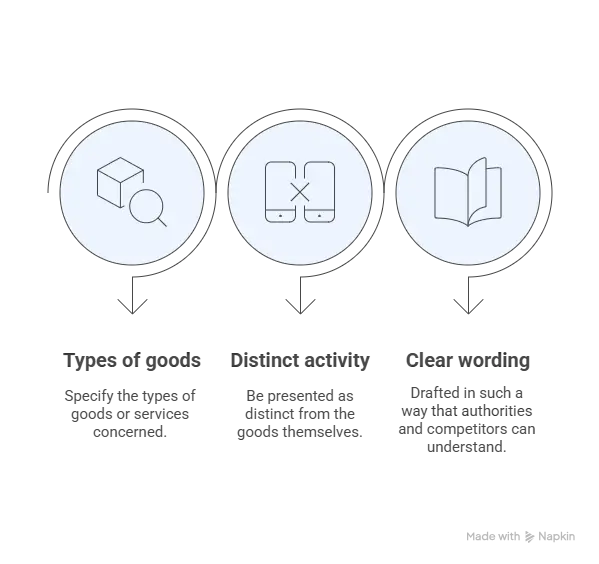Sommaire
- 1 Introduction
- 2 The legal framework of retail services in Class 35
- 3 The conditions of admissibility for retail services
- 4 The Netto Marken-Discount ruling: scope and practical implications
- 5 The boundary between goods and services in retail
- 6 Jurisprudential developments in 2025
- 7 Practical guidance for trademark applicants
- 8 Conclusion
- 9 FAQ
Introduction
The Court of Justice of the European Union (CJEU) has provided an essential clarification: retail services, when properly defined, can be protected as services falling under Class 35 of the Nice Classification. This recognition applies not only to the sale of goods but also to the sale of services, thereby expanding the scope of trademark protection for businesses operating in hybrid commercial environments. Understanding the legal framework, the conditions of admissibility, and the practical implications is crucial for any company wishing to secure its brand.
The legal framework of retail services in Class 35
Trademark law in the European Union was harmonised by Directive 2008/95/EC, later replaced by Directive (EU) 2015/2436. Class 35 of the Nice Classification covers services such as advertising, business management, and retail trade.
The long-debated question was whether the act of commercialising goods or services constituted an autonomous service eligible for trademark protection. The CJEU answered positively, provided that applications respect the requirement of clarity and precision set out in EU law.
The conditions of admissibility for retail services
To be accepted in Class 35, retail services must:
- Specify the types of goods or services concerned (cosmetics, clothing, financial services, etc.);
- Be presented as an activity distinct from the goods themselves;
- Be drafted so that authorities and competitors can clearly understand the scope of protection claimed.
This requirement stems directly from the IP Translator judgment (CJEU, C-307/10), which imposes a precise and unequivocal wording of trademark specifications.
The Netto Marken-Discount ruling: scope and practical implications
In this case (10 july 2014 C-420/13), the CJEU confirmed that retail services cover both goods and services. These activities therefore fall within Class 35, as long as their wording is sufficiently precise.
Practical implication: a trademark registration can now protect both the physical sale of goods (e.g., supermarkets, fashion stores) and the sale of intangible services (e.g., online travel agencies, financial service platforms).
This reinforces the ability of brand owners to act against third parties seeking to exploit a trademark in a distribution context.
The boundary between goods and services in retail
The ruling clarifies a previously delicate distinction. Traditionally, goods fell within Classes 1 to 34, while services belonged to Classes 35 to 45. By recognising the retail of services, the CJEU acknowledges the evolution of commerce, where companies often act as both producers and service providers.
Example: a telecom operator markets mobile phones (goods) but also mobile subscription plans (services). Trademark protection must reflect this dual reality.
Jurisprudential developments in 2025
Since the 2014 ruling, EUIPO practice has evolved. In 2025, case law confirms that:
- Specifications such as “retail services for pharmaceutical preparations” are admissible;
- Overly broad wording such as “all retail services” is refused;
- Courts require that evidence of use specifically relates to retail services, pursuant to Article 18 EUTMR.
The General Court has recently emphasised that these services must demonstrate a separate economic value to justify protection.
Practical guidance for trademark applicants
To optimise protection, businesses should:
- Seek advice from industrial property specialists;
- Draft specific descriptions of retail services;
- Prepare evidence of use in advance;
- Anticipate international divergences, as some jurisdictions (United States, China) do not recognise retail services in the same way.
An integrated strategy is therefore essential to avoid gaps in brand protection.
Conclusion
The recognition of retail services in Class 35 represents a significant step forward for trademark protection. The CJEU’s approach reflects commercial developments and provides businesses with an effective tool to secure their activities, both for goods and for services.
Dreyfus Law firm assists its clients in managing complex intellectual property cases, offering personalized advice and comprehensive operational support for the complete protection of intellectual property.
Dreyfus Law firm is partnered with a global network of lawyers specializing in intellectual property.
Nathalie Dreyfus with the assistance of the entire Dreyfus team.
FAQ
1. Does the CJEU recognise retail services as protectable in Class 35?
Yes, provided they are defined with clarity and precision.
2. Does this protection cover only goods?
No, it also extends to intangible services.
3. What details must the application include?
It must specify the types of goods or services concerned.
4. What is the risk of overly broad or vague wording?
The application may be refused for lack of precision.
5. What is the practical importance of the Netto Marken-Discount ruling?
It broadens trademark protection to new forms of commerce.


